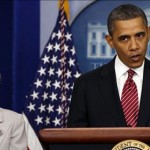I have an interview up on National Review Online with David Gelernter about the revolution that has taken place in the United States in recent decades. You might find his discussion of religion of particular interest.
Here:
Post-religious thinkers don’t even live on the same spiritual planet as Protestant, Catholic, and Jewish Americans. Old-time atheists struggled with biblical religion and rejected it; modern post-religious thinkers struggled with nothing. Since the Bible and biblical religion underlie the invention of America, it’s hard (unsurprisingly) for post-religious people to understand America sympathetically. Abraham Lincoln’s Second Inaugural, the most sacred of American texts, is (precisely) a sermon describing North and South as equally guilty in God’s eyes for the sin of slavery and, ultimately, for the war itself:
Fondly do we hope, fervently do we pray, that this mighty scourge of war may speedily pass away. Yet, if God wills that it continue until all the wealth piled by the bondsman’s two hundred and fifty years of unrequited toil shall be sunk, and until every drop of blood drawn with the lash shall be paid by another drawn with the sword, as was said three thousand years ago, so still it must be said, “the judgments of the Lord are true and righteous altogether.”
The quote is from Psalms 19; Reagan’s famous “shining city on a hill” paraphrases the gospels. Expecting post-religious, Bible-ignorant thinkers to grasp America is like expecting a gerbil to sing Pagliacci. The gerbil might be brilliant in his way, but he’ll never make it in opera. (If this be species-ism, make the most of it!) How can my post-religious colleagues and countrymen, many of whom have never even opened a Bible, understand Lincoln or America or Americans?
and here:
LOPEZ: Is it really possible to move forward with the best of what we’ve had in a united way? Some of the religiously affiliated institutions went bankrupt, or were otherwise bought out or closed. Believers don’t know what they believe quite like they used to, memorizing the Baltimore Catechism and all. Now we’ve got a government openly mandating the religious to the sidelines while using altar boys to make the sale. Aren’t we beyond hope here in any kind of rebuilding? Some of us may remember#…#vaguely#…#but are the blueprints and the work ethic still there?
GELERNTER: This was and remains a religious country. There is nothing hypothetical (barring some unthinkable catastrophe) about the survival and success of Judaism and Christianity in America. Many left-wing religious brands are out of business or flailing helplessly as they take on water, but up-to-date religion never did make sense, because religion is our lifeline and a sort of love letter to our families, our ancestors, and our better selves.
In some fundamental ways, choices we are making right now in culture and politics have everything to do with eternal matters and how we regard them in our lives and as a society. Is religion a good thing? Real religion? The freedom to believe it and live it? We used to think so, and so we protected it. We even encouraged it. Will we continue to? Because we’re not anymore — not as of August 1, when the HHS mandate forcing Americans to participate in the buying and offering of contraception, sterilization, and abortion-inducing drug coverage of goes into effect.












